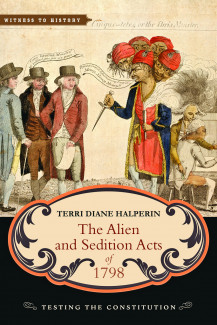
Johns Hopkins UniversityEst. 1876
America’s First Research University
Behind the Book: The Alien & Sedition Acts of 1798

I have been teaching a class called Liberty vs. Security about the politics of speech from Colonial America through the Civil War for a few years. In this class, we talk about when and why American governments have (or attempted) to limit speech, whether these limits are legitimate and effective, and how Americans have reacted to such limitations. I wanted to write a book that took the supporters of the Alien and Sedition Acts seriously and not simply dismiss them as party hacks who would do anything to defend the Federalist Party. One theme of my class is the role of dissent in the Early American Republic especially at a time when many considered dissent to be treason. When was dissent acceptable, how could one disagree with the government, where could one express one’s displeasure?
You can hear lots of echoes of the 1798-1800 debate in today’s politics from how people talk about immigrants as dangerous to what defines a truly patriotic American. In the late 1790s, Americans, Federalists in particular, believed that immigrants could destabilize American government by introducing radical ideas into American political debate. Federalists looked at the chaos of the ongoing European wars and wanted to insulate Americans from that. I learned that while Federalists’ fears were overblown and exaggerated, their concerns did have some merit as French refugees did engage in questionable behavior as they traveled about the United States. Francois Furstenberg’s When the United States Spoke French (Penguin Press, 2014) was a great resource for me and helped me think differently about how at least French immigrants were viewed by many Americans.
As I was reading the congressional debates on the passage, repeal, and renewal of the Sedition Act, many times I felt as if I could be reading a contemporary debate about national security, and the role of political leaders and the press. Federalists believed that political leaders, especially members of Congress and the Executive, should be obliged to support government policy and the law. In 1798, doing so was particularly important because the United States faced several threats –both external and internal. The United States was involved in an undeclared naval war with France and at least Federalists believed France had many sympathizers in America –immigrants from France and Ireland and American citizens who did not seem to recognize the dangers despite all the Federalist leaders’ warnings. I did have a few moments when I read something from a 1798 newspaper, pamphlet, or congressional speech which could have easily appeared in today’s morning’s newspaper.
I just finished Donald Ratcliffe’s book about the Election of 1824 which has its own set of parallels to the current presidential election. Many of the things that were said about Andrew Jackson in 1824 have been said about Donald Trump in 2016. I am currently reading Wendell Bird’s Press and Speech under Assault: Early Supreme Court Justices, the Sedition Act of 1798, and the Campaign against Dissent (Oxford, 2016) which is an in depth look at English Common Law traditions and a legal history of freedom of speech and the press through the 1790s.
Terri Diane Halperin is a member of the history department at the University of Richmond. Her book, The Alien and Sedition Acts of 1798: Testing the Constitution is available now.


